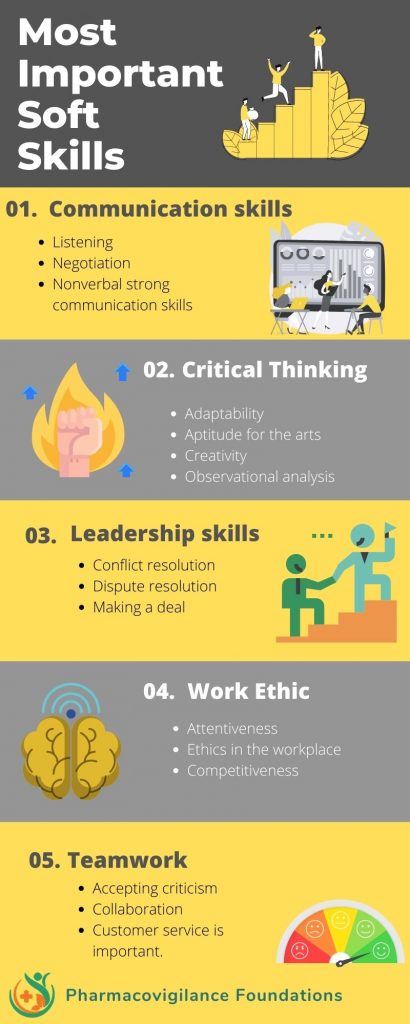121 Top Soft Skills Examples Needed For Successful HCPs in 202420 min read

Soft skills for Pharmacists and other healthcare professionals (HCPs) are in high demand profession, and the hard and soft skills needed to be successful in these roles are changing. In order to stay ahead of the curve, it’s important to know what these skills are.
In order to be successful in the healthcare industry in 2022, it is essential that you possess a set of top soft skills and solid hard skills.
Soft skills are personal qualities that enable you to interact effectively and harmoniously with other people not only in the working space but also when doing a job search as active listening to HR in the interview.
They are important because they help you manage relationships, navigate difficult conversations, and resolve conflicts.
Sharing my experience that leads me to get these certificates to make the Pharmacovigilance Foundation initiative
In this blog post, we will discuss:
- the complete list of soft skills examples that you need to have to be successful as a healthcare professional to dominate your workspace.
- Hard Skills (technical skills) vs. Soft Skills (non-technical skills)
- How to Make Your Skills Stand Out in any interview process
- Services to write your resume.

What Are Soft Skills?
Soft skills are essential for success in any healthcare career. They are the skills that pharmacists use to interact with patients and staff, and they are essential for providing quality patient care.
Soft skills include communication, teamwork, problem solving skills, and critical thinking. These skills are essential for success in any healthcare career.

Pharmacists must be able to communicate effectively with patients and staff, and they must be able to work effectively as part of a team. They must also be able to solve problems and make decisions quickly and efficiently.
Healthcare professionals who possess soft skills are in high demand, and they are essential for providing quality patient care.
If you are interested in a career in healthcare, it is important to develop your soft skills if you want to be successful in the healthcare field.
What are the Benefits of Soft Skills? & Why are soft skills important?

When choosing a career in healthcare, it is important to consider your own personal traits and how they might impact your work.
Some personality traits, such as empathy or flexibility, may enhance your performance as a healthcare professional and make you particularly well-suited for certain roles.
On the other hand, some less desirable personality traits, such as impatience or insensitivity, could hinder your ability to connect with patients and be successful in your career.
To determine what kind of role would be right for you, it is essential to carefully analyze and understand your personal strengths and weaknesses.
This can be done by examining job descriptions for potential roles and assessing whether each one aligns well with your unique set of soft skills.
In addition, you should think about any transferable skills that you may have developed through previous jobs or volunteer activities.
By doing so, you will be able to identify the best possible career path for yourself based on who you are as a person.
Ultimately, having the right mix of personality traits and transferable skills will be critical for success in your healthcare career. After all, having the right qualities can help to ensure that you are a caring, compassionate professional who truly makes a positive difference in people’s lives.
As a healthcare professional, soft skills are just as important as hard skills. Oftentimes, soft skills are the deciding factor in whether or not a patient chooses to return to a specific pharmacist or healthcare provider.
Good soft skills can help build trust between you and the patient and can go a long way in establishing a good rapport.
Soft skills can also help you to better understand the needs of your patient and can make it easier to provide them with the best possible care. In addition, soft skills can help you to better handle difficult situations and can make it easier to resolve conflict.
By developing soft skills, you will be better equipped to provide the highest quality of care possible for your patients.
Soft Skills Quiz
What are your strongest Soft Skills
What are the most popular soft skills list every Healthcare Professional should have?
While hard skills are important for landing a job, it’s soft skills that will help you to excel in your career. Here are some of the most important soft skills that everyone should have:
Communication skills
Being able to have effective communication is essential for success in any field. Whether you’re writing reports, giving presentations, or simply interacting with colleagues, communicating clearly and concisely will help you get ahead.
- Listening
- Negotiation
- Nonverbal strong communication skills
- Persuasion
- Presentation
- Public speaking
- Reading body language
- Social skills
- Storytelling
- Verbal communication skills
- Visual communication skills
- Writing reports and proposals
- Writing Essays
- Writing skills
Critical Thinking
Considering the vastness of the internet, it’s no surprise that there’s a lot of misinformation out there.
That’s why it’s more important than ever to develop critical thinking skills. When evaluating information, it’s important to consider the source, its bias, and any ulterior motives that may be at play.
It’s also important to look at the evidence objectively and to consider all sides of an issue before forming an opinion.
Critical thinking is a valuable soft skill that can help you not only in your personal life but also in your professional career.
In today’s increasingly global and fast-paced world, the ability to think critically and make sound decisions is essential. Whether you’re evaluating a business opportunity or considering a new job offer, sharp critical thinking.
- Adaptability
- Aptitude for the arts
- Creativity
- Observational analysis
- The ability to think critically
- aptitude for design
- Willingness to learn
- Flexibility
- Innovation
- Logical reasoning
- Problem solving
- Research
- Resourcefulness
- Imaginative problem-solving
- Change and uncertainty tolerance
- Troubleshooting
- eagerness to learn
Leadership skills
Leaders are important because they provide direction, set an example, and motivate others to achieve goals.
They possess a number of soft skills that enable them to do this effectively, including communication, problem-solving, decision making, and team building.
Leaders also need to be able to adapt to changing circumstances and be open to new ideas. without leadership skills, organizations would lack direction and purpose. Individuals would not have anyone to look up to or emulate.
And there would be no one to drive change or inspire others to reach their full potential. In short, leadership is essential for both individuals and organizations to thrive.
- Conflict resolution
- Dispute resolution
- Making a deal
- Making decisions
- Delegation Resolution of disagreements
- Facilitation
- Providing specific feedback
- People who inspire you
- Leadership
- Management
- Taking control of unpleasant conversations
- Managing virtual/remote teams
- Management of meetings
- Mentoring Motivating
- Management of a project
- Problem solving
- Coaching that works
- Supervising
- Management of talent
Positive Attitude
A Positive Attitude is important as a soft skill for several reasons. First, when you have a Positive Attitude, it shows in your actions and demeanor. This can put people at ease and make them more likely to want to work with you. Second, a Positive Attitude is contagious.
If you are upbeat and happy, it is likely that those around you will be as well. This can make the work environment more pleasant for everyone involved.
Finally, having a Positive Attitude demonstrate that you are resilient and adaptable. No matter what challenges come your way, you remain upbeat and focused on finding a solution. This is an essential soft skill in today’s ever changing workplace.
- Honesty
- Humorous
- Patience
- Respectability
- Respectfulness
- Confidence
- Cooperation
- Courtesy
- Energy
- Enthusiasm
- Friendliness
Teamwork
No matter what industry you’re in, chances are you’ll need to work with others at some point. Being a good team player is essential for keeping projects on track and maintaining good working relationships.
- Accepting criticism
- Collaboration
- Customer service is important.
- Dealing with tense circumstances
- Managing office politics
- Disability awareness is important.
- Awareness of differences
- Emotional intelligence is a term that refers to the ability to
- Developing interpersonal connections
- Dealing with obstinate individuals
- Intercultural competence
- Personality traits
- Influence
- Networking
- Persuasion
- Self-awareness
- Selling abilities
- Social abilities
- Creating a team
Work Ethic
A work ethic is one of the most important other soft skills that an employee can possess. It is the focus and dedication that an individual brings to their job, and it can be a deciding factor in whether or not they are successful.
work ethic can be defined as an individual’s attitudes, beliefs, and values about their work.
It is the foundation upon which an individual builds their career, and it can determine how they approach their goals.
A strong work ethic is essential for any employee who wants to be successful. Individuals with a work ethic are typically more motivated and dedicate more time and effort to their jobs.
They are also more likely to take on new challenges and responsibilities, and they are less likely to make excuses for their mistakes.
- Attentiveness
- Ethics in the workplace
- Competitiveness
- Dedication
- Dependability
- Following direction
- Independence
- Sticking to deadlines
- Motivation
- Multitasking
- Organization\perseverance
- Persistence\planning
- Business etiquette is important.
- Punctuality
- Reliability
- Resilience
- Results-oriented
- Scheduling
- Self-directed
- Self-monitoring\Self-supervising
- Keeping focused on the task Strategic planning
- Organize your time.
- Trainability
- Working well under pressure
Hard Skills vs. Soft Skills
What Is the Difference Between a Soft Skill and a Hard Skill?

Soft skills and hard skills are often used interchangeably, but they actually refer to two different types of abilities.
Hard skills are the technical abilities that you learn through education and training. They are specific to a particular job or field and can usually be measured objectively.
For example, a healthcare professional might have excellent clinical skills, while a pharmacist might have laboratory skills. soft skills, on the other hand, are interpersonal abilities that help you to interact effectively with others.
They are more difficult to quantify, but they are just as important in the workplace. For example, a healthcare professional who can effectively communicate with patients is likely to provide better care than one who cannot.
Likewise, likely to be successful.
A pharmacist who can build good relationships with doctors and nurses is more likely to be successful. Soft skills, like building relationships, are important in the healthcare industry.
Strong relationships are essential for communication and collaboration, which are key to success in the industry.
What are Soft Skills specifically required for Working in the Healthcare Field?

Empathy
Empathy is the soft skill of being able to understand and share the feelings of another person. For healthcare professionals, empathy is essential in order to provide quality care.
When patients are dealing with a difficult situation, such as a chronic illness or the death of a loved one, they need someone who can understand and empathize with their feelings.
Healthcare professionals who can show empathy will be better able to connect with their patients and provide the best possible care.
In addition, empathy is also an important soft skill for healthcare professionals to have when interacting with colleagues.
By understanding and empathizing with the feelings of others, healthcare professionals can build strong working relationships and create a positive work environment.
Open Mindset
An open mindset soft skill for healthcare professionals is the ability to be open to new ideas and perspectives.
This soft skill is important for healthcare professionals because it allows them to be open to new ways of thinking about healthcare issues and problems.
Healthcare is a rapidly changing field, and new ideas and perspectives are constantly emerging.
Healthcare professionals who have an open mindset and soft skills are better able to adapt to change and stay up-to-date with the latest developments in the field.
Additionally, open mindset soft skills can help healthcare professionals build better relationships with patients and families.
When healthcare professionals are open to hearing new perspectives, it shows that they value the input of others and are willing to work collaboratively to provide the best possible care.
Adaptability
One of the most essential qualities for healthcare professionals is adaptability. Adapting to changing circumstances and new situations is essential in a field where things are constantly changing.
Adaptability is key to success in healthcare, from new treatments and technologies to policy changes. Healthcare professionals who can adapt quickly and easily to change will be better able to provide the best care for their patients.
Additionally, adaptability is an essential soft skill that can help healthcare professionals stand out.
When employers are looking for candidates, those with solid and soft skills, like adaptability, will be more likely to get the job. Therefore, adaptability is an essential soft skill for healthcare professionals.
Self-confidence
In the healthcare industry, self-confidence is a highly prized soft skill. Healthcare professionals who are self-confident often possess the ability to inspire trust and confidence in others.
This soft skill can be particularly important when working with patients and their families. Those who are self-confident are often able to put others at ease, build rapport, and establish trust quickly.
As a result, self-confident healthcare professionals can often provide better patient care. Additionally, self-confidence can also help build a positive work environment.
Those who are self-confident often radiate positive energy and act as leaders within their workplaces.
As a result, they can help to create a positive work culture and foster innovation within their teams.
How to find out my weakness and strangeness in the soft skills list?

Before going to an interview, think about what employers want.
They want to know your qualities that will make you the best employee.
Determining Your Strengths
soft skills are the personal attributes and abilities that enable you to interact effectively with others.
They are also sometimes referred to as people skills or interpersonal skills. However you refer to them, soft skills are essential for personal and professional success.
So how can you determine your strength in soft skills? An excellent place to start is by looking at a list of soft skills and seeing which ones come naturally to you.
Do you find it easy to communicate with others, even with disagreements? Do you have a knack for quickly building rapport? Do you stay calm under pressure? Any of these would be indicative of solid and soft skills.
Of course, soft skills are constantly evolving.
Just because you’re good at something doesn’t mean you don’t need to continue to work on it. Soft skills are no different. There is always room for improvement, and practicing your soft skills is the best way to improve them.
The best way to improve your soft skills is to find opportunities to use them.
For example, I work well in teams.
I like to work in teams. When my division was reorganized, I was put on a team with people from different backgrounds and experience levels without an obvious hierarchy; there were lots of sparks (and some fireworks).
So we organized regular bonding sessions for our group that helped break down some boundaries at the office while also taking it upon myself to handle more cumbersome tasks others didn’t want to do you know how everyone loves complaining, but nobody likes doing?).
And then when I left?! Tons of gratitude from fellow employees because they said what diplomacy harmony made possible
Determining Your Weaknesses
One of the most important things you can do regarding your career is to make sure you are aware of your weaknesses.
You hope to improve upon these areas only by honing in on them. When it comes to soft skills, there are a few key ways to determine which areas you need to focus on.
First, look at what soft skills are typically required for your dream job or role within your company. If there are specific skills that you know you lack, those are worth focusing on.
Another way to identify your weaknesses is through feedback from others. Ask your boss or coworkers for their honest opinions on where you could improve.
Finally, take some time for introspection and think about areas where you tend to have weaknesses.
For example, I can be impatient
Being a manager is hard work.
You have to ensure deadlines are met; employees get their tasks done on time and without any hiccups along the way- all while maintaining good relationships with each person on your team! It’s been challenging for me.
At first, because I used to micromanage my staff often before, but now that I’m learning how important it can sometimes be not everything needs directing from above; Instead, we’ve found success by trusting our people, so they’ll do what needs doing when its due–and haven’t missed yet!).
How to List Soft Skills on a Resume?

1. List what soft skills employers want.
This can be done by looking at the job offer they posted and noting down all their requirements.
2. Make a true list of your strong soft skills.
Of the many skills you have, which ones make up your strong side? To find out what areas of expertise might be worth accentuating in an application process or interview for a job position with this company, please answer these questions:
1) Which soft skill do I leverage most often when working on projects at school/university etc.? (e., English literature);
2). What other languages can conversate smoothly but lack fluency like my native tongue?
3..How well do these same talents hold up under pressure while talking face-to-face.
3. Compare your list to the job offer.
Writing a memorable resume is being honest and putting your best foot forward. Don’t worry if it’s not perfect– that will come with time!
For now, focus on what makes you stand out from other candidates by highlighting skills because these can set someone apart in today’s competitive workforce environment, where talent has become more critical than ever before (especially when there are so many people already doing precisely those things).
Make sure also includes some examples of work done well as this shows potential employers how dedicated/accomplished etc…you may be able
4. Add your strong soft skills to your resume profile.
5. Also, write down your soft skills in a dedicated skills section.
How Employer will you evaluate your soft skills in the previous workplace?
The assessment of soft skills is no easy feat because they’re often intangible and can’t be measured by simply looking at what each candidate includes on their resume.
Candidates will try to present themselves positively during interviews, so it’s up to dig deeper into the applicant’s qualities to uncover how these candidates might bring something valuable to a company.
When considering soft skills in the workplace, employers often look for qualities that are essential for success in any field.
However, some soft skills are particularly important in the healthcare field. For example, a healthcare professional must be able to communicate effectively with patients and families, as well as with other members of the healthcare team.
They must also be able to work well under pressure, often in stressful and fast-paced environments. In addition, a healthcare professional must be able to demonstrate empathy, compassion, and a commitment to providing quality care.
How do they screen soft skills in potential candidates?
- Knowing what they’re looking for in a candidate is important before interviewing them.
- They ask the candidate about their past jobs and how they have used soft skills to learn more information.
- They may use mind games and activities for testing specific abilities.
Best online professional resume writing services – Best Pickup

FAQs for You to ask Yourself
1. What soft skills do you think are the most important for healthcare professionals?
2. Do you think that soft skills can be taught, or are they something that comes naturally?
3. Are there any healthcare professionals you have worked with with outstanding soft skills?
4. What is the best way to learn about and develop soft skills?
5. Have you ever had a patient who was particularly challenging to deal with due to their lack of soft skills? If so, how did you handle the situation?
Wrap Up
Soft skills are critical for career success, and there are many reasons why you should develop and cultivate these essential skills. One of the most obvious is their importance on your resume.
In today’s increasingly competitive job market, it is essential to stand out from the crowd, and having a solid set of soft skills on your CV can help ensure that you get noticed.
These skills also make you more valuable as an employee, allowing you to excel in project and time management roles. But perhaps even more importantly, soft skills help you to develop strong relationships with those around you.
Whether it be your colleagues, clients, suppliers, or customers, having the ability to communicate effectively and work well in teams will enable you to build successful professional relationships that will ultimately benefit your career.
So if you want to be successful in any industry or role, you must cultivate soft skills. After all, they could make the difference between getting ahead in your career…or get left behind!

